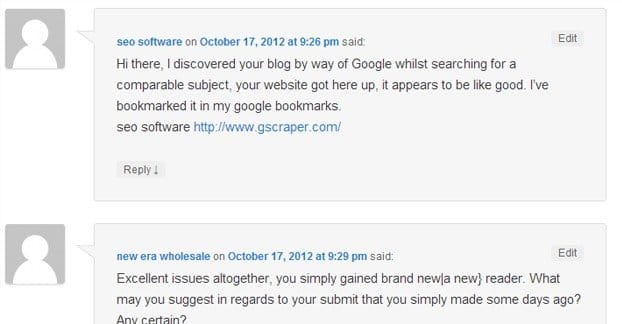 Written by ContentPowered.com
Written by ContentPowered.com
There are a lot of different comment systems out there, from the default WordPress package to the SEO-abusing CommentLuv. The three biggest happen to be WordPress, Disqus, and Facebook, so those are the ones I’ll be discussing here. Rather than waste time, let’s get right to it.
WordPress Native Comments
The comments system that comes natively with WordPress when you first install it is nothing to sneeze at. Hundreds of thousands of blogs run it with no problems whatsoever, though I would venture to guess that many of those are lazy enough they simply don’t care to change. It’s a perfectly serviceable comments system, with a few pros and a few cons.
Pro: Works automatically, so you don’t need to install anything. This is why it has such high adoption amongst users; you don’t need to install plugins to get it working, it’s just there. Plus, every WordPress theme ever made is already made with comments in mind, so you don’t have to worry about your theme breaking when you install a new comments plugin.
Pro: Has numerous security, extension, and anti-spam plugins. If you want to add captchas to it, if you want to get more anti-spam filtering going, if you want user verification, you can do all if it with additional plugins. Of course, requiring plugins to do that isn’t always a great thing, but having the option there is always good. Plugins like Akismet don’t work with third party comment systems, which use their own anti-spam.
Pro: Design is very easy to customize to match your site. It’s absolutely trivial to change how the WordPress comments system looks. Every theme does it to some extent, though the darker themes tend to change it more. It’s a simple matter of CSS for the most part, though you can do more direct changes in terms of code if you want to dig into it.
Pro: Very fast to load due to native integration. If your comments are taking longer than two seconds to load, I’d be extremely surprised. That only happens on sites with custom plugins changing how they work, and only when they have hundreds of comments. Even then, having them load asynchronously is great, because they don’t delay the page load and they’re loaded by the time the reader gets down to them.
Con: Needs the user to fill out several fields in order to comment. By default they need to essentially create an account for every site they want to comment on, regardless of whether or not they have accounts on other WordPress sites or if they have a WordPress blog of their own. It can be a stumbling block for engagement and can be detrimental to your comment community.
Con: Very easy to receive spam comments, and requires either a plugin or attentive monitoring to avoid a spam flood. By default, WordPress comments are set to require approval to post. That means you need to constantly monitor your comment stream in order to approve the good ones and delete the bad ones. If you slip, they will build up, and it becomes more annoying than ever to deal with.
Con: Spam detection is well understood and is frequently circumvented. Despite adaptive plugins like Akismet, spam still gets through, and if you enable free or guest posting, you’re opening yourself up to a seemingly endless stream of spam. It can be a massive pain to clean up the spam and it drives away users, because they feel like you’re not attentive.
The verdict here is that WordPress default comments are serviceable, they work, but they have a few annoying drawbacks. The question is, are the alternatives any better?
Disqus Comments
Disqus is something more than just a comments plugin. In addition to comments, it becomes a sort of central hub for creators and users both. It’s almost like a social network integrated with your site. You can see all of the comments you have made in one place at once, and you can comment in response to replies to your comments straight from the dashboard. In addition, content creators running Disqus on their sites are able to access analytics. So how do they stack up with the pros and cons?
Pro: Easy to comment once registered. Once you’ve created a Disqus account, you have it. It allows you to comment on any blog that uses Disqus, and on Disqus itself, without having to plug in information every time. It’s very much like a social network, though focused around commenting on content rather than commenting on other comments.
Pro: Can be registered with social accounts or a WordPress account as well. On top of registration being a one-time thing, it’s also very easy. They’ve made it trivial to register with any number of different social accounts, a WordPress account, or just a plain old Disqus account using email verification. It’s up to your users what they want to use, but they have a whole host of options.
Pro: Has a good and easy to use UI. It can’t be underestimated how nice it is to have an easy UI when you’re investigating commenting on a new site. If it’s at all complicated to try to put the information in the right place, or if it requires a field not everyone has, it’s just going to be that much harder for people to post. The harder it is to comment, the fewer comments you get.
Pro: Email verification helps curb spam. On top of that, Disqus has their own ever-evolving spam detection, which not only helps prevent spam from being posted, it removes spammer accounts. When such an account is removed, so too are all of their comments, including any spam comments on your site regardless of whether those comments were reported or not.
Pro: Includes centralized analytics for comments in your dashboard. Content creators can see what kind of posts they’ve made and what kind of engagement they’ve gotten. It’s a quick and easy way to monitor your engagement independently of Google Analytics or whatever other suites you might have installed.
Con: Requires a plugin installation. This is going to be a drawback of every third party comments plugin simply because of the nature of plugins. Any additional code, no matter how light, is going to slow down your page. It also is a potential point of failure, if you install it poorly. You have to keep it up to date as well, because it can become a security issue if you don’t do so.
Con: Design is difficult to customize to match your site design. There’s very little you can do to change the appearance of Disqus. You can see every possible tweak you can make here. For the most part, it’s just limited to changing the size of the comment threads, a few display options, and a choice between light and dark color schemes.
Con: Somewhat slow to load due to external access. This is also another common problem with third party comment plugins in particular. The comments and the script need to load from somewhere, and some of that data comes from the servers owned by Disqus. In this case, the comments themselves are still stored in the WordPress database, but you still have some content to load from external servers.
Con: Includes their own native advertising on your site. This can be both a pro and a con. Disqus runs ads on your site, but you do get to have your cut of them as a publisher if you enroll in their Reveal program. It’s easy enough to do, and you’ll get a meager payday, but it might not be worthwhile given how disruptive it can be and how it might overload your site if you’re already running several other ads.
So, Disqus is a great central hub and it makes it easier to build a community around your comments without having to spend every waking moment worrying about timely approvals or spam removal. However, the ads you can’t remove might be a deal-breaker for some users.
Facebook Blog Comments
The third most popular comments plugin is Facebook’s, primarily because Facebook itself is so popular. You already have an audience of over a billion people using the site; they can all comment on your blog posts without issue if you allow them to. This can be a great benefit, but Facebook has a few drawbacks as well.
Pro: Everyone has a Facebook account and can comment automatically. They don’t need to register, they don’t need to verify, all they need to do is click a button to log in, if they haven’t already. Most people already are logged in and can comment easily from where they are.
Pro: Requiring a Facebook account is a double layer of anti-spam defense. Facebook has a lot of their own anti-spam, and if a spammer is found, they are removed, with similar effects as what happens to them on Disqus. However, since it’s more complex to make a new Facebook account, it’s difficult for spammers to make a bunch of spam accounts to hit Facebook-enabled blogs.
Pro: Combines social and blog comment engagement in one place, unlike other systems. Users have a portal directly to Facebook, and from Facebook they can see interactions on their comments. This can keep engagement going even when they aren’t still on your site.
Pro: The comments are SEO friendly. In the past, Facebook loaded on their own servers, and the content didn’t appear on your site so comments did nothing for your SEO. These days, hidden frames behind their comment plugin allow the content to be indexed on your site, for full SEO value.
Con: Not everyone wants their Facebook spread everywhere. A lot of people will hesitate to comment when their real names are associated with whatever they have to say. Either they don’t want their Facebook friends to know what sites they frequent, or they were going to post something they don’t want to be held accountable for. This isn’t always a bad thing, but it will diminish your engagement numbers.
Con: Requires a plugin installation. This is going to be a drawback of every third party comments plugin simply because of the nature of plugins. Any additional code, no matter how light, is going to slow down your page. It also is a potential point of failure, if you install it poorly. You have to keep it up to date as well, because it can become a security issue if you don’t do so.
Con: Isn’t very customizable to match your blog design. Much like Disqus, you are limited to a light or a dark theme, and a few other basic customization options. This means regardless of what your site looks like, Facebook comments are always going to look like Facebook.
Con: Somewhat slow to load due to external access. Facebook isn’t known for its speed. Comments are relatively lightweight, but they still take a moment to load, which is more than using native WordPress comments would.
Facebook can be great for lengthy, high value engagement, but for casual one-off posts you will probably see a drop in engagement compared to basic WordPress comments. I recommend testing if it works out better for you.
No Comments At All
There’s one more option: not using a comments system at all. Think about it; does every post you make really need comments? It’s always an option to simply disable them. This will speed up your site and make spam no longer a concern. It will also encourage people to direct their concerns to you through chat or contact methods rather than in a public forum where it can reflect badly on you.
It’s hard to unify a community when some are used to Facebook, some are used to Disqus, some to LiveFyre, some to CommentLuv, and some to others. Plus, comment threads will pop upon Facebook independently, and on Twitter, and anywhere else your content is shown.
If you’re going to use comments, I would probably consider Disqus the best, with Facebook a close second. However, the true answer comes down to whichever works best in your own testing.







Thanks for sharing this. Can I import Native WordPress comments to the Disqus? because I just built my blog and there are few comments on my fist blog post (with WordPress comments) but, now I want to use Disqus as my comment system. What should I do? I don’t want to lose even a single comment for my first ever article because as a beginner I love every single comment on my blog. Hope you can understand my feelings. Basically, I want to know that can we shift between WordPress comment system and Disqus without loosing comments? Other thing is, can’t we comment without even logging with social media accounts or email in Disqus system? I thought it could be a pain for strange visitors no?
Both solutions are great for SEO, the downside of FB is that no analytics are available. Gustavo Woltmann
To comment or not to comment that is the question. We are going to so some testing and see what is more popular.
I’m leaning more towards Facebook Comments. In our case, about 90% of our readers have a Facebook account. I’m guessing that only 5-10% of our readers have a Disqus account – so in the long run, we would only be creating an extra hurdle for them to jump through. Additionally, we may be able to target our paid Facebook placements through the use of Facebook Comments. Edit: I just found this NPR article very interesting: http://www.npr.org/sections/ombudsman/2016/08/17/489516952/npr-website-to-get-rid-of-comments
You also get a social share signal!
I think I’ll go with facebook, considering my client have a strong presence there, and the social engagement would be a great benefit. Thank you for this comparison, very valuable.
Helpful post. I’m surprised to see no options for: 1) Paying to avoid ads 2) Combination social commenting / forum system where users can seamlessly participate in both forms with a site.
Nice post. Thank you for taking the time to provide a detailed analysis. I will stick with Disqus. My only problem is that it is duplicated avatars for lots of my members.
Thanks for this thorough guide. I’m in the process of cleaning up spam comments from my company’s blog. We use Facebook comments and people are still leaving them – really am considering switching after reading this.
nice summary of the 3
Interesting. I see you chose to go with Disqus here! I’m really juggling whether I’ll switch away from Disqus or not. Facebook is tempting…but is it necessary? Not sure, for me.
It depends more on the niche. Is it more of a social/entertainment blog? Go with Facebook. Is it a tech or more targeted to something like Android, go with Disqus.
Disqus is better.
Very usable and reasonable post!
Disqus comments are indexed by Google ?
Nice summary. I am thinking whether I should just use both Disqus and Facebook.
If you change from the standard WordPress commenting, I assume you lose all of your comments when if switching to Facebook? Would I be right?
Nice summary. About Disqus Ads, it’s a con with the free plan, but you can remove the ads with a paid plan. And one pro of wordpress native comments is that it can be imported into Disqus, so it can be a nice alternative if you want to start with an ad free solution but might want to switch do Disqus when you’ll be ready to pay.
Thanks for this breakdown! Do you know whether Disqus can be integrated into Leadpages?
It can be integrated just about anywhere that allows HTML! They have a universal integration where you paste a little line of code and it will show up. It should work just fine if you can edit your template on there.
interesting.
seems like you are using disquis despite writing an article about the best comments options for wordpress. i had problems with disquis working in the first place, so i deactivated it. Facebook comments did not send me notifications when i received comments. I now have decided to use the WordPress comments system so that I can reply to comments and that system has worked great for me for SEO purposes, and is content for my blog as well. Someone asks me where to buy something, I reply to it. Facebook comments arent easy to reply to because i dont get notifications. There are many pros and cons and i just trust WordPress’s system instead over the other two alternatives. thats just me thogh
We actually recently removed Disqus for this reason. It’s just gotten too slow, they’ve started charging people, and it’s a pain to sync between WordPress and Disqus. WordPress comments are just so much faster and it’s easier for people to comment without jumping through hoops. Plus, it’s better for your SEO as you’ve mentioned since comments can actually be seen in your source code by search engines, instead of displayed through Javascript, which isn’t ideal. I don’t think Disqus or Facebook comments are very good for SEO at all.
Thanks for the info!
NO on Facebook, due to privacy concerns. Disqus and WordPress are both good – I use Disqus more.